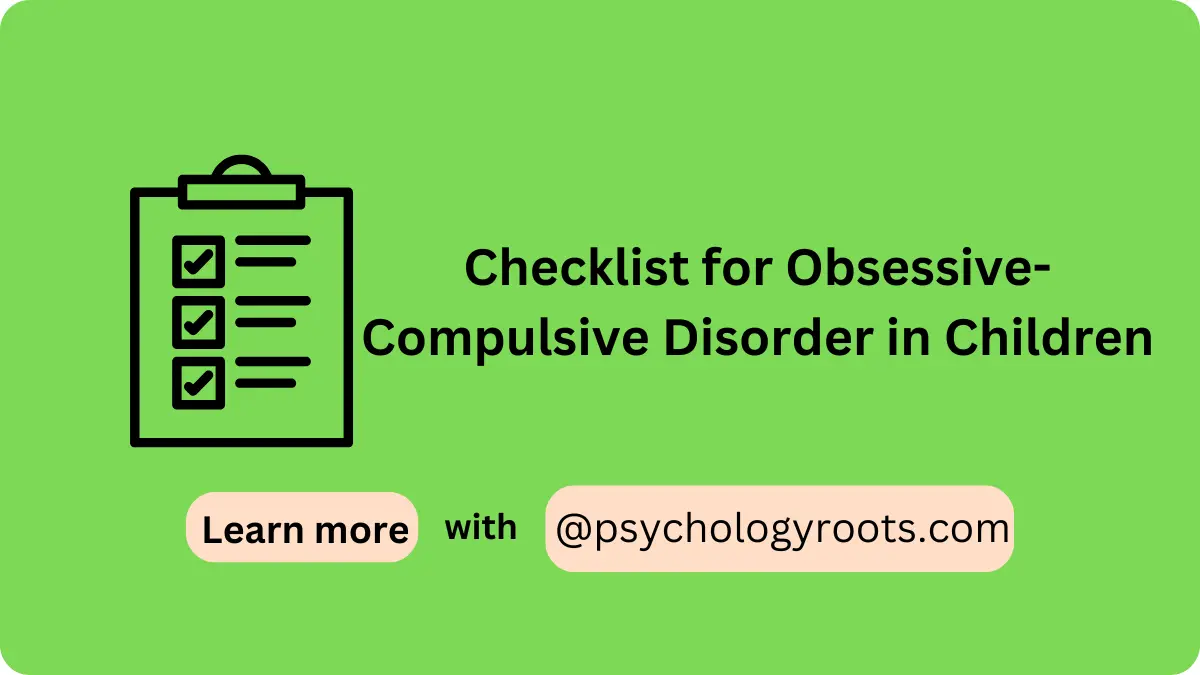Table of Contents
Checklist for Obsessive-Compulsive Disorder in Children
Here in this post, we are sharing the “Checklist for Obsessive-Compulsive Disorder in Children”. You can read psychometric and Author information. We have thousands of Scales and questionnaires in our collection (See Scales and Questionnaires). You can demand us any scale and questionnaires related to psychology through our community, and we will provide you with a short time. Keep visiting Psychology Roots.
About Checklist for Obsessive-Compulsive Disorder in Children
Scale Name
Checklist for Obsessive-Compulsive Disorder in Children
Author Details
Compiled by Phillips & Phillips
Translation Availability
English

Background/Description
The Checklist for Obsessive-Compulsive Disorder in Children is a structured assessment tool designed to identify and evaluate symptoms of Obsessive-Compulsive Disorder (OCD) in children. Compiled by Phillips & Phillips, this checklist provides caregivers, clinicians, and educators with a reliable method for observing and documenting OCD symptoms in young individuals.
OCD in children often manifests through repetitive behaviors, intense preoccupations, and intrusive thoughts that can disrupt daily functioning. Early identification through tools like this checklist is essential for effective intervention, as untreated OCD can significantly impact a child’s social, academic, and emotional well-being. The checklist is especially valuable for early detection and intervention planning, offering structured guidance for assessing symptom severity and frequency.
Administration, Scoring and Interpretation
- Obtain the Copy: Available through Ann Arbor Publishers Limited or professional psychological resources.
- Purpose: To assess and document symptoms of OCD in children for early intervention and support.
- Instructions: Respondents (typically parents or caregivers) rate the frequency and intensity of observed OCD symptoms in the child.
- Time: Approximately 10–15 minutes to complete.
- Administer the Scale: Can be administered in clinical or educational settings by trained professionals or used as a parent-report measure.
Reliability and Validity
The Checklist for Obsessive-Compulsive Disorder in Children is a widely accepted tool in both clinical and educational settings, providing reliable observational data for assessing OCD in young populations. Although specific psychometric properties like Cronbach’s alpha are not frequently published, the checklist’s structured approach and widespread use underscore its reliability and practical value. Its validity is supported by the alignment with established OCD diagnostic criteria, which enhances the checklist’s effectiveness for early screening purposes.
Available Versions
40-Items
Reference
Phillips, & Phillips. (2012). Checklist for Obsessive Compulsive Disorder in Children. Ann Arbor Publishers Limited.
Important Link
Scale File:
Frequently Asked Questions
What age group is this checklist designed for?
Primarily for children and adolescents suspected of displaying OCD symptoms.
Who should complete the checklist?
Parents, caregivers, or professionals familiar with the child’s behavior.
Is this checklist used for diagnostic purposes?
While it aids in identifying symptoms, a comprehensive clinical evaluation is required for an official diagnosis.
How can I access the checklist?
It is available through Ann Arbor Publishers Limited or licensed clinical resources.
Disclaimer
Please note that Psychology Roots does not have the right to grant permission for the use of any psychological scales or assessments listed on its website. To use any scale or assessment, you must obtain permission directly from the author or translator of the tool. Psychology Roots provides information about various tools and their administration procedures, but it is your responsibility to obtain proper permissions before using any scale or assessment. If you need further information about an author’s contact details, please submit a query to the Psychology Roots team.
Help Us Improve This Article
Have you discovered an inaccuracy? We put out great effort to give accurate and scientifically trustworthy information to our readers. Please notify us if you discover any typographical or grammatical errors.
Make a comment. We acknowledge and appreciate your efforts.
Share With Us
If you have any scale or any material related to psychology kindly share it with us at psychologyroots@gmail.com. We help others on behalf of you.